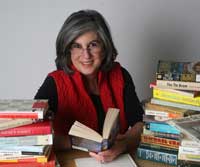Monday, June 2: The Scribbler
BOOKEXPO REPORT
by James Lincoln Warren
 Today is the final day of BookExpo America 2008, the American Booksellers Association’s annual trade show and convention. BEA is held in several different cities on a rotating basis, and this year was in Los Angeles. Mystery Writers of America always have a presence, and so this year, I volunteered to be a worker bee at the MWA booth. I was asked to come in and help out on Friday.
Today is the final day of BookExpo America 2008, the American Booksellers Association’s annual trade show and convention. BEA is held in several different cities on a rotating basis, and this year was in Los Angeles. Mystery Writers of America always have a presence, and so this year, I volunteered to be a worker bee at the MWA booth. I was asked to come in and help out on Friday.
The Los Angeles Convention Center is one of the largest of its kind and there were literally acres of exhibitors, all giving away books, books, books, and sponsoring appearances by their celebrity authors. It can be a little overwhelming. But I wasn’t there to get freebies. I worked long enough as a bookseller not to covet free books I will probably never read. 1 I was there mainly to provide as much help as I could setting up book signings—as a former bookseller, I know all the little tricks, like “flapping”, i.e., bookmarking the title page with the left flap of the dust jacket, which makes it easier for the author to open the book and sign it—and also to help recruit new members and to ask for librarians’ and booksellers’ contact information for author events.
And, of course, I was there to attend the MWA cocktail party on Friday evening. Free booze and crime writers are always a welcome combination as far as I’m concerned.
 This was held at a relatively new and ultra-hip downtown lounge called The Edison, located in the building that housed the first private power plant in Los Angeles. This has to be seen to be believed. It’s huge, decorated in a Victorian/Deco fusion, and they were showing 20s vintage movies on two walls.
This was held at a relatively new and ultra-hip downtown lounge called The Edison, located in the building that housed the first private power plant in Los Angeles. This has to be seen to be believed. It’s huge, decorated in a Victorian/Deco fusion, and they were showing 20s vintage movies on two walls.
Now, Gentle Readers, I blushingly confess to having certain pretensions to style. On Friday, I wore a light olive suit with a dark blue shirt with French cuffs and a yellow floral-print bow tie, and was told of my outfit: “That’s you, all right.” But style is relative. One can have style without being ultra-hip, or hip ordinaire, or even infra-hip. And I have never, ever, ever, been ultra-hip, or so much as fleetingly proximate to ultra-hip. Not even to plain vanilla hip. (Just possibly deep infra-hip, that is, at that end of the spectrum requiring night vision goggles to detect.) But jamais pas ultra, especially not as that term is understood in L.A.
But I had a grand time and I loved the bar. It is always fun to meet writers from everywhere else, and to see old friends from foreign parts on one’s home turf, so to speak. Many of the authors, of course, had no idea who the hell I was, nor should they have, and I was only too delighted to briefly impinge on their consciousnesses.
“What do you do?” I was asked by a novelist. Which seemed to me to be a pretty silly question at a party for writers—this was asked of me once before at a party for writers, by the person I mentioned last week who idiotically told me that short stories are all plot driven, and I thought the question silly, then, too—but I admit that some folks attending the bash were agents and booksellers and other associated hangers-on, so it’s not altogether ridiculous.
“I write short stories.”
“Where are they published?” (This is much preferred over another common question, viz., “And are you published?”)
“Alfred Hitchcock and Ellery Queen.”
“You must be very good. Those are very difficult markets to break into.” (I have composited parts of several conversations I had that evening; this comment was actually made to me twice by completely different people.)
“Thank you.” I was now awaiting the inevitable comment. I could feel it rolling down the Sisyphean slope, aimed right between my eyes. And as certain as the sun ariseth in the east, it burst forth:
“Short stories are a lot more difficult to write than novels.”
Pause. I sipped my martini, waiting for someone to charge to my rescue.
Alas, in vain. I replied: “At the risk of ribald laughter, I think it’s a matter of artistic temperament, if you’ll pardon the expression. I write short stories, and to me, the short story seems like the most natural form for telling stories, especially mysteries.”
(Therewith followed a brief discussion of the history of mystery fiction and the short story, which having been told more than once here on Criminal Brief, I shall not repeat—but here’s a link to my first CB column, which recapitulates the arguments.)
“But it takes so much discipline to write short stories. I couldn’t do it.”
Nods from around the table from other novelists. One joined the fray: “She’s right. Short stories do take much more discipline.”
I wish this were true, because it would mean that I have discipline when I write, when I know that my work habits may be generously described as, well, slovenly. Bill Pronzini points out that if you write a page a day, that is, 250 to 300 words each and very day, that at the end of a year you’ll have a full length novel. Now that’s discipline.
 Then the charming Hallie Ephron, who has written a highly regarded book on how to write mystery novels and was seated to my left, said, “Well, I do think that you have to know how your story ends before you can write a short story. That’s not necessarily true of writing a novel.”2
Then the charming Hallie Ephron, who has written a highly regarded book on how to write mystery novels and was seated to my left, said, “Well, I do think that you have to know how your story ends before you can write a short story. That’s not necessarily true of writing a novel.”2
Well, having to know what comes next is mostly true, I guess, although there are several stories I wrote halfway through before I had any clue how to tie them up at the end, stories that came screeching to a halt until the reluctant Muse finally cleared her throat and made some suggestions—and some of them are my best work.
Another novelist opined that because of space constraints, by which she meant word count, the author cannot allow himself to be distracted into pursuing any thread that might digress from the plot. Well, that’s certainly true, but it’s just as true of novels, albeit on a different scale. But it reminded me of something someone had told me earlier that day at BEA:
“I don’t read short stories. When I read something, I like to get lost in it, and short stories don’t give you [by whom she meant herself, I presume. —JLW] that chance.”
I found this a curious comment, given how so much imaginative fiction is the form of shorts, but I had a glimmering of what she meant—she’s the kind of reader who does not instantaneously dissociate herself from reality when she reads. It takes her some time to be enfolded in the narrative, to feel part of the story. Now personally, I might consider this at least partially a failure of imagination on her part, but she was dead right on at least one point, and that is that the short story doesn’t have time to meander around and give you a feeling of the neighborhood before it gets down to business.
The short story writer has to encourage the reader to fill in that part of the picture himself, what I call “making the reader do the work.” So maybe it takes more work—more discipline—not just to write a short story rather than a novel, but actually to read the short story. Now this is a startling proposition. Could this be true? Is it like the difference between sprinting twenty yards to catch the bus and jogging half a mile in the park for pleasure?
If it really does take more work, even if less time, to read a good short story than it does to read a novel, how do we encourage the reader to make that extra effort?
For my part, I polished off my martini and wandered off to circulate among all the wonderful and fascinating folks at our party. My brain was buzzing, but that was probably the gin.
- A few weeks ago, I listed Warren’s Laws, but here are Warren’s Rules, which have to do with keeping one’s home from being more cluttered than it already is, which is to say, stacked to the gunwales with books:
I. Never buy a book until you are ready to read it.
II. One book in, one book out.
III. Unless you know you will read the book more than once, wait for the paperback.
IV. Only reference books that will be used multiply and continuously, i.e., dictionaries, style manuals, histories, etc., are exempt from Rules I and II.
V. Books written by close friends are exempt from Rule III. [↩]
- Anthony Trollope once wrote, “When I sit down to write a novel I do not at all know, and I do not very much care, how it will end.” [↩]




















Yes, the Edison is a truly spooky and wondrous place for mystery writers to meet and drink, and I almost became the corpse as I tripped my way down the steps to the loo.
Yes, I guess that conversation about short story writing did sound a bit lame, but it really IS hard to do well, and those of us who can’t admire those who can… sir. And just fyi, I **always** know how my novel is going to end when I start writing and about half the time I’m wrong.
Loved the tie.
– Hallie
BEA is the best.
I helped out at the SinC booth at BEA in New York last year and really enjoyed assisting the novelist with book signings and finding librarians and book sellers to introduce to our SinC authors.
I think we encourage the reader to do the work of reading a short story by writing really good ones. As a reader the criteria for a good novel or for a good short story is the same for me. If I am a bit sad when it’s over because I don’t want the characters to go away, then I really enjoyed the story.
Terrie
James,
Is Archie Goodwin picking out you clothes?
Or “your” clothes.
My figure is much more like Nero Wolfe’s.